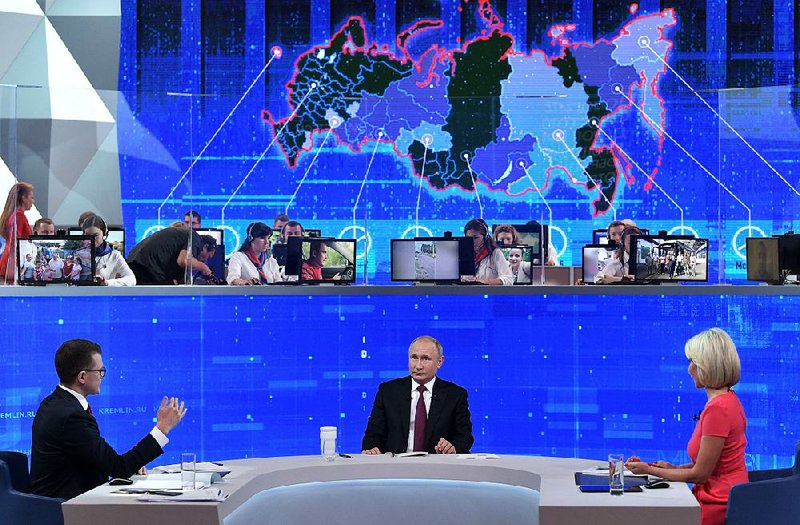MOSCOW -- Russian President Vladimir Putin, facing simmering domestic discontent, took to national television Thursday with a message: I feel your pain, but I'm the only one who can ease it.
In his annual call-in show, Putin fielded questions -- at least some pre-screened -- from citizens across the country concerned about low incomes and poor medical care. He responded as he has in the past -- yes, things are hard, but the Kremlin is working to make them better.
Asked at the top of show whether life in Russia had gotten harder, Putin said: "This is indeed the case." Lower oil prices had indeed contributed to a shock to the Russian economy.
But incomes were starting to grow again, he claimed, and the government was taking measures to improve households' bottom lines.
The raw numbers suggest Russia's economy is climbing out of a hole. The International Monetary Fund predicts modest gross domestic product growth of 1.6% this year.
But other measures show Russia is still gripped by corruption and fiscal mismanagement. The civil society watchdog group Transparency International ranked Russia in the bottom third of countries, saying "cronyism remains a cornerstone of Russian social and political processes."
In another segment, reporters for state TV were shown fanning out across the country to investigate claims of long lines at medical clinics. They showed a brand new dentist chair in a small village and a town hospital with modern equipment.
But hospital officials and patients told the reporters that it was hard to attract skilled workers to rural areas.
"There are lots of problems, but in general, the sector is developing," Putin said, referring to health care. Promising that he'd make sure things would keep improving, he added: "It's one thing when a minister says it. It's another thing when I say it." His health minister then chimed in by video link to reinforce the message.
Putin's annual "Direct Line" call-in show has been a core element of his image-making since 2001, sometimes lasting more than four hours. Russians are invited to send in questions to the president. He responds to dozens of them -- often about granular, local matters, accompanied by on-the-ground TV reports. His immediate directives to officials to look into those problems are meant to paint a picture of a president who is attuned to regular Russians' lives.
Putin looks out for the common man, the message goes, even if lower-level officials don't. Pro-Kremlin news media showed photos of Putin preparing for the call by studying an inches-thick stack of paper.
On the state television broadcast Thursday of the call-in show, the hosts said their call center was receiving 900 calls per minute with questions for the president. More than 1.5 million questions were submitted in all, the Kremlin said. There was even a smartphone app allowing Russians to record their question on video.
Putin touched on geopolitics. He urged Russians not to worry about international sanctions, claiming that the European Union had suffered more from its sanctions on Russia over the Ukraine crisis than Russia itself did.
He also promised to examine the cases of 24 Ukrainian sailors and other Ukrainians behind bars in Russia, but only in conjunction with the cases of what he said were Russians wrongfully imprisoned in Ukraine.
Asked about a New York Times report that the United States had mounted a cyber incursion into Russia's power grid, Putin said he had seen President Donald Trump's reaction to the article accusing the newspaper of "treason."
"I don't understand how we are supposed to interpret this," Putin said. "Does this mean they published existing, real information or that they put out a fake? In any case, we need to react somehow and understand what this is all about."
Responding to another question, Putin said he was prepared to meet with Trump, but that the U.S. president faces domestic head winds in improving ties with Russia. Trump has said he expects to meet Putin on the sidelines of a Group of 20 summit in Japan next week, but the one-on-one hasn't been officially confirmed.
Putin repeated a frequent complaint in Moscow about U.S. checks and balances tying Trump's hands.
"If the president wants to take steps in our direction, wants to talk about something, there is a massive amount of limits from other centers of power, especially now that the current head of state will be looking at the demands of the election campaign," Putin said.
A Section on 06/21/2019

